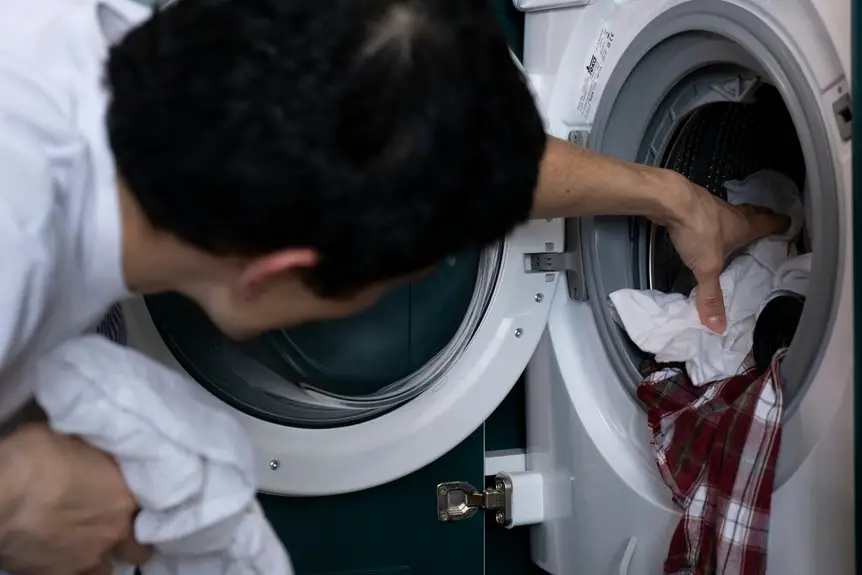Your washing machine can make your clothes smell bad due to dampness, mold, and bacteria buildup. If you leave wet clothes in the washer or use too much detergent, odors can linger. Neglecting regular maintenance or cleaning your machine can also contribute to unpleasant smells. Additionally, poorly drying your clothes traps moisture that fosters mildew. To tackle these issues and keep your laundry fresh, you can uncover more helpful tips to improve your washing experience.
Table of Contents
Key Takeaways
- Dampness in the washing machine can create mold and mildew, leading to unpleasant odors in clothes.
- Residual detergent buildup may trap odors and promote bacterial growth, causing clothes to smell bad.
- Leaving wet clothes in the washer allows bacteria to thrive, resulting in sour smells.
- Neglecting regular maintenance of the washer, like cleaning seals and dispensers, can lead to musty odors.
- Improper drying techniques, such as not fully drying clothes, can create an environment for mold and musty smells.
Common Causes of Odor in Laundry
When your laundry comes out smelling less than fresh, it can be frustrating.
Laundry that smells less than fresh can be a frustrating experience for anyone.
There are several common causes behind this unpleasant odor. First, dampness in your washing machine can lead to mold or mildew growth, transferring that musty smell to your clothes.
Additionally, leaving wet clothes in the washer for too long can create an environment for bacteria to thrive. If you’re washing heavily soiled or sweaty items, the residue can linger, causing odors to stick around.
Using too much detergent can also trap dirt and grime, contributing to the smell.
Finally, check your laundry basket; a dirty or damp basket can add to the problem, making your freshly washed clothes smell bad right from the start.
The Role of Detergent in Washing Machine Smells
Detergent plays a notable role in the odors that can develop in your washing machine and laundry. When you use too much detergent, it can leave residue that traps moisture, creating a breeding ground for smells.
Here are three ways detergent contributes to unpleasant odors:
- Excess Residue: Using more detergent than needed can cause buildup that retains odors.
- Improper Rinsing: If your washer doesn’t rinse well, leftover detergent can lead to sour smells.
- Incompatible Products: Mixing different types of detergents can create a chemical reaction, resulting in unwanted smells.
To keep your laundry fresh, be mindful of how much detergent you use and guarantee your washer rinses properly.
This simple change can greatly improve your washing experience.
Bacteria and Mold Buildup in Your Washer
If your washing machine smells bad, bacteria and mold buildup might be the culprit.
These unwanted intruders thrive in damp environments, especially if you leave wet clothes sitting too long.
Let’s explore what causes this growth and how you can prevent it from happening.
Causes of Bacteria Growth
A washing machine can quickly become a breeding ground for bacteria and mold, especially in damp environments.
If you notice a bad smell coming from your clothes, it’s likely due to a few key factors:
- Residual Detergent: Too much detergent can leave residue that promotes bacterial growth.
- Moisture Traps: Areas like door seals and dispensers can hold water, creating a perfect environment for mold to thrive.
- Low-Temperature Washes: Washing clothes in cold water can fail to kill bacteria and spores, allowing them to multiply.
Preventing Mold Development
To prevent mold from developing in your washing machine, it’s crucial to adopt a few simple habits.
First, always leave the door or lid open after a wash to allow air circulation, helping to dry out any residual moisture.
Clean the rubber seals regularly, as they can trap water and create a breeding ground for mold.
Use a washing machine cleaner monthly to eliminate any buildup.
Additionally, avoid overloading your washer, as this can prevent proper rinsing and drying.
If you use cold water for washing, consider adding a hot wash occasionally to kill off bacteria.
Finally, regularly check and clean your detergent dispenser to make sure it’s not harboring any mold.
Following these steps will keep your washer fresh and your clothes smelling great.
The Impact of Hard Water on Laundry Odor
While you mightn’t realize it, hard water can considerably contribute to unpleasant odors in your laundry. The minerals in hard water, like calcium and magnesium, can trap soap residues in your clothes, leading to musty smells.
Hard water can lead to musty smells in your laundry by trapping soap residues with its mineral content.
Here are three ways hard water impacts your laundry odor:
- Soap Scum Formation: Hard water reacts with soap, creating scum that clings to fabrics, causing odors.
- Ineffective Cleaning: The minerals prevent detergents from working efficiently, leaving dirt and grime behind, which can smell bad.
- Bacterial Growth: The residue from hard water can promote bacterial growth in your laundry, resulting in even more odors.
Switching to a water softener or using specially formulated detergents can help mitigate these issues.
Neglecting Washing Machine Maintenance
Neglecting regular maintenance on your washing machine can lead to musty odors that cling to your clothes.
If you don’t clean the drum, detergent dispenser, and rubber door seal, residue builds up over time, creating a breeding ground for mold and mildew.
Skipping maintenance also means you miss out on checking hoses and filters, which can get clogged and contribute to unpleasant smells.
You might think it’s enough to just throw in detergent, but that won’t solve the issue.
Regularly running a cleaning cycle with specialized products can help.
Additionally, leaving the door ajar after washing allows moisture to escape, preventing odors from forming.
Stay on top of your washing machine maintenance to keep your laundry smelling fresh!
Storing Dirty Clothes Before Washing
When you store dirty clothes before washing, humidity can lead to unpleasant odors.
The longer you keep them, the more likely those smells will develop.
It’s crucial to reflect on how long your clothes sit in the hamper and the conditions they’re in.
Humidity and Odor Growth
Storing dirty clothes before washing can create the perfect environment for odors to thrive, especially in humid conditions.
When moisture lingers in your laundry, it encourages the growth of bacteria and mold, leading to unpleasant smells.
To minimize odor development, consider the following:
- Air Circulation: Keep your laundry area well-ventilated. A breezy space helps reduce humidity and keeps your clothes fresher for longer.
- Storage Solutions: Use breathable laundry bags or baskets to allow airflow, rather than sealing them in plastic containers that trap moisture.
- Timing: If possible, wash clothes promptly after wearing them. The longer they sit in a humid environment, the more likely they’ll develop those unwanted odors.
Duration of Storage Matters
The length of time you leave dirty clothes before washing plays an essential role in how they smell. When you store your clothes for days or even weeks, bacteria and mold thrive in the fabric’s dampness. This can lead to unpleasant odors that washing alone may not eliminate.
If you toss your sweaty workout gear into a laundry basket and forget about it, you’re inviting odors to develop. Ideally, you should wash dirty clothes within 24 hours to minimize odor buildup.
If that’s not possible, consider letting them air out instead of leaving them in a closed hamper. Taking these steps helps maintain freshness and keeps your washing machine from becoming a source of bad smells.
The Effects of Overloading Your Washing Machine
Overloading your washing machine can lead to a host of problems, including musty odors that cling to your clothes. When you stuff your washer beyond its capacity, you’re inviting trouble.
Here’s what happens:
- Inefficient Cleaning: Clothes can’t move freely, preventing detergent from reaching all areas. This means dirt and grime get left behind, creating odors.
- Poor Rinsing: Overloading hampers proper rinsing, leaving soap residue. This residue can contribute to unpleasant smells over time.
- Increased Wear: Excess weight strains the machine, leading to mechanical issues. A malfunctioning washer mightn’t clean properly, ultimately resulting in smelly laundry.
The Importance of Proper Drying Techniques
While you might think washing your clothes is enough, proper drying techniques are essential to prevent bad odors from lingering.
When clothes aren’t dried thoroughly, moisture can get trapped, creating the perfect environment for mold and mildew. You should always dry your clothes completely, either by using a dryer or hanging them up in a well-ventilated area.
If you’re using a dryer, make sure it’s set to the appropriate heat level for the fabric type. If air-drying, avoid damp spaces and direct sunlight can help maintain freshness.
Tips for Keeping Your Laundry Fresh and Odor-Free
Keeping your laundry fresh and odor-free requires attention to more than just drying. You need to take into account a few essential practices to maintain that clean scent.
Maintaining fresh and odor-free laundry goes beyond drying; it’s about adopting essential practices for that lasting clean scent.
Here are three tips to help you out:
- Regularly clean your washing machine: Bacteria and mildew can build up, leading to unpleasant odors. Run a hot cycle with white vinegar every month to keep things fresh.
- Use the right detergent: Opt for a high-quality detergent that fights odors. Avoid overloading your machine to guarantee proper cleaning.
- Store clothes properly: Don’t leave damp clothes in the washer. Transfer them to the dryer or hang them up right away to prevent musty smells.
Following these tips will help you enjoy laundry that smells as fresh as it looks!
Frequently Asked Questions
Can Using Fabric Softeners Cause Odors in Clothes?
Imagine wrapping yourself in a soft, fragrant blanket. But when you use fabric softeners, residues can build up, trapping odors instead. So, yes, those beloved scents might sometimes turn into unwelcome smells on your clothes.
How Often Should I Clean My Washing Machine?
You should clean your washing machine every month to prevent buildup. Regular maintenance helps eliminate odors and keeps your laundry fresh. Just run a hot cycle with vinegar or a washing machine cleaner for best results.
Does the Type of Washing Machine Affect Odor?
Did you know that front-loading washers can harbor 30% more bacteria than top-loaders? Yes, the type of washing machine affects odor. Regular maintenance and cleaning can help keep your clothes smelling fresh and clean.
Are There Specific Fabrics That Retain Smells More?
Certain fabrics, like synthetic materials, tend to retain odors more than natural fibers. When you wash these fabrics, you might notice lingering smells if they’re not cleaned properly or dried thoroughly. Consider your laundry habits!
Can I Prevent Odors With Essential Oils in the Wash?
Think of your laundry as a garden. You can absolutely prevent odors with essential oils; just add a few drops during the wash. They’ll freshen your clothes, leaving them smelling delightful and vibrant after every cycle.
- A Crafter’s Guide to Painting and Decorating Nonwoven Bags - July 12, 2025
- Can You Iron, Bleach, or Dye Nonwoven Fabrics? - July 12, 2025
- What Is SMS Nonwoven Fabric and Where Is It Used? - July 12, 2025







